The Maldives conjures dreamy picture-postcard images of tropical atolls and palm-fringed islands with white sandy beaches, swaying coconut palm trees, wooden dhonis sailing on gentle sea breezes, and gin-clear waters teeming with a myriad of colorful sea life, and in reality, it doesn’t fail to deliver.
However, this oceanic slice of heaven also has a dark side, and it comes in the form of plastic. The devastation caused by the throw-away lifestyles of the West is clearly and very sadly evident around the country on both the land and sea, with balls of plastic nets, bottles, boxes, and flip-flops floating on top of the ocean and gathering in piles on the island’s sandy beaches.
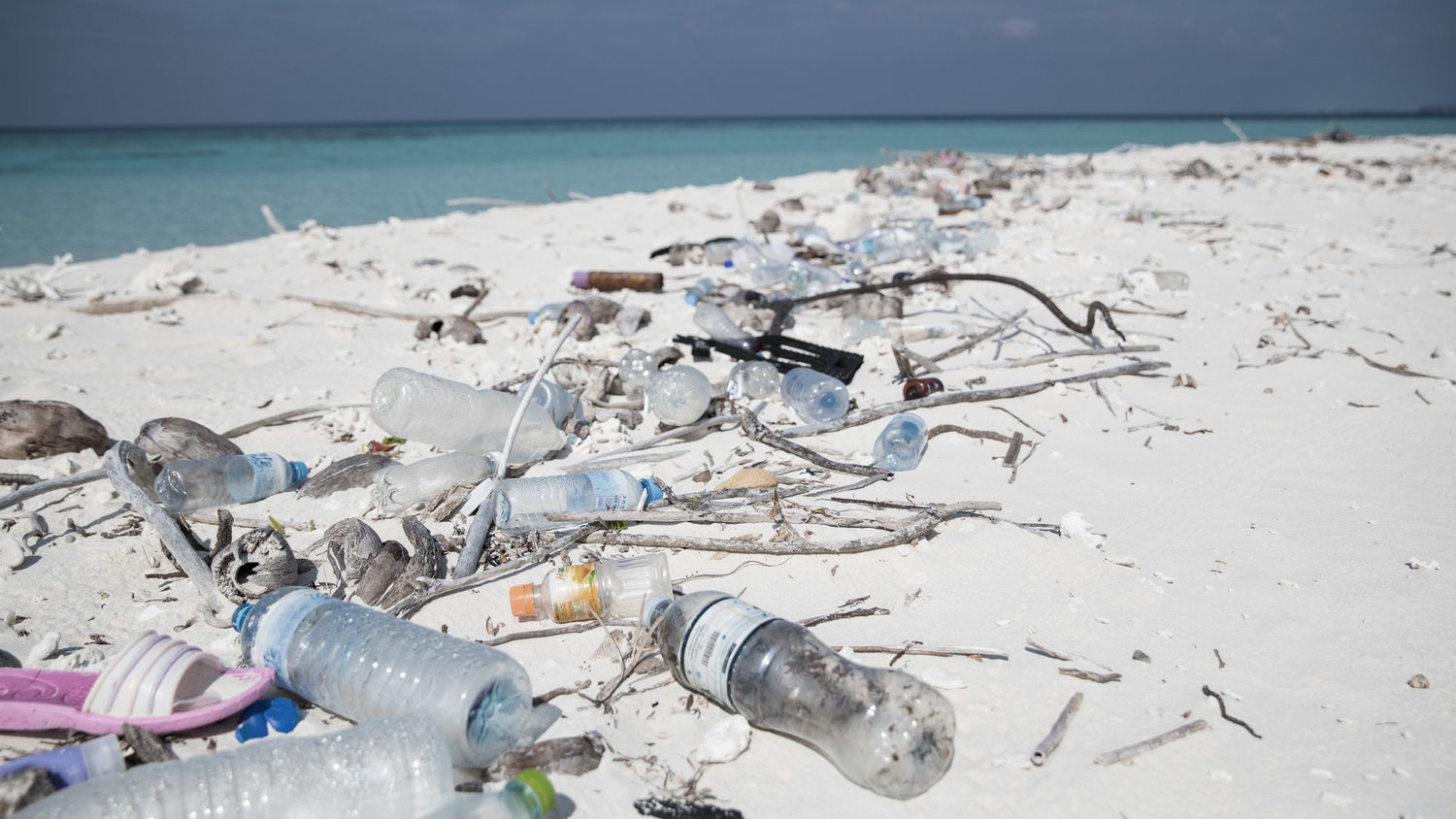 Photo credit: Parley TV
Photo credit: Parley TV
Devastating Consequences
The Maldives produces an estimated 500 tons of rubbish per day, with vast amounts of water-borne waste from other countries carried in daily on the Indian Ocean currents. All garbage collected in the Maldives is taken to ‘Trash Island,’ otherwise known as Thilafushi, an island landfill made entirely of waste. The islands’ sole waste-processing plant on the reclaimed island is itself built partly from rubbish and is stretched to capacity with the huge influx of floating plastic bottles, bags and junk washing up on the islands’ beaches.
The increasing levels of ocean-bound plastic and pollution are not only an eyesore for a country that relies so heavily on tourism as their primary source of income but is also having a devastating effect on the local wildlife. Everything from crabs and fish to turtles, dolphins and even whale sharks get caught in the enormous netballs that can be found floating around the ocean, as well as end up consuming the tiny plastic particles that form from the breakdown of larger pieces of plastic. According to statistics, almost 700 marine species are threatened with extinction because of this material.
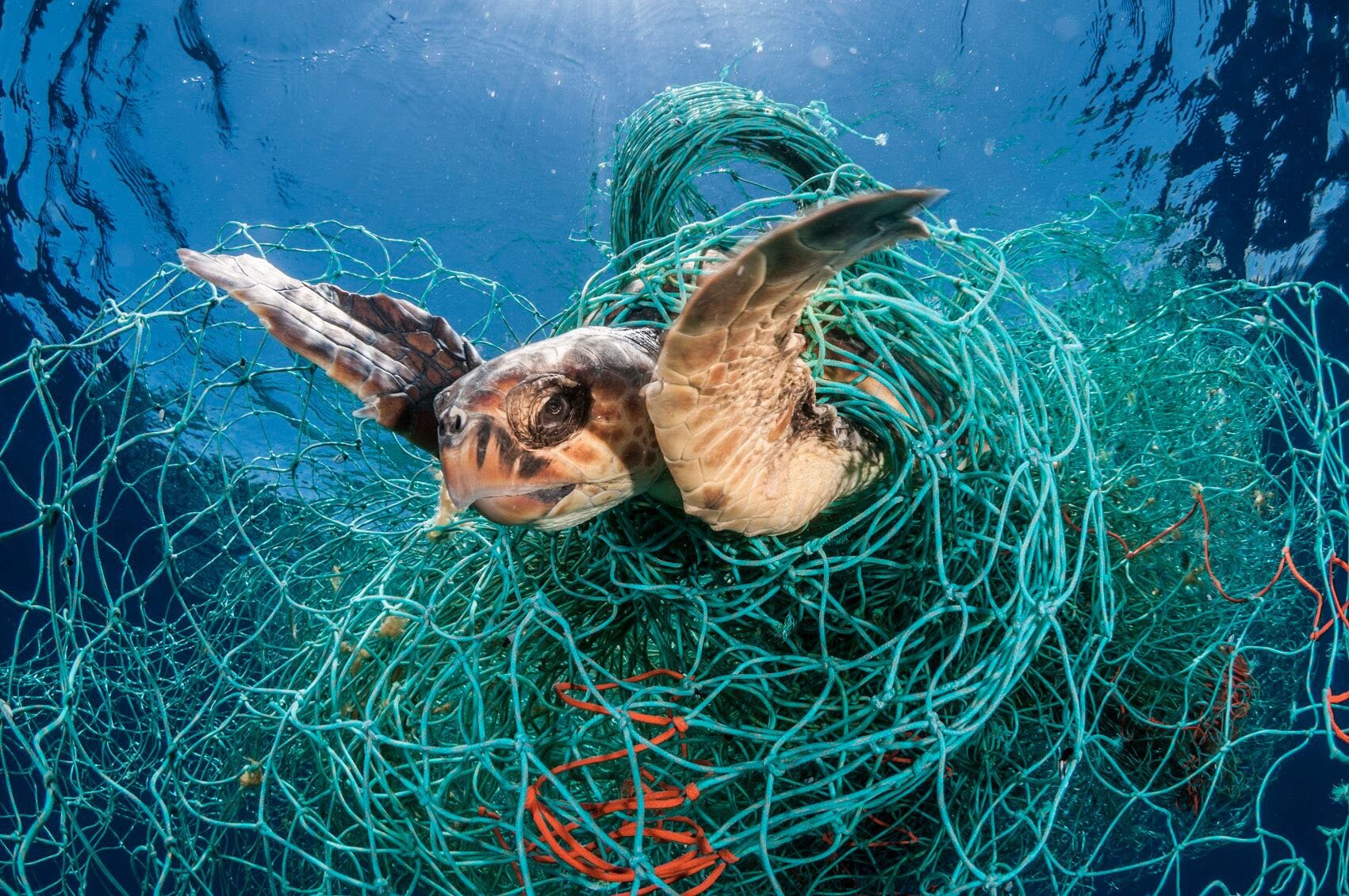 Photo credit: Independent.co.uk
Photo credit: Independent.co.uk
It is estimated that around 50% of sea turtles have plastic in their stomachs and it is predicted by the Environmental Investigation Agency that by the year 2050, all seabirds will have ingested plastic. Further up the food chain, they found that 70% of dolphins stranded on beaches had ingested plastic debris and even the magnificent whale sharks that filter vast amounts of seawater are susceptible to storing high amounts of pollutants from marine debris, including plastic.
Sea turtles are under serious threat across the world’s oceans and are officially listed as threatened by IUCN (the International Union for Conservation of Nature). Five of the seven species of sea turtles can be found in the Maldives, with the two most common being the hawksbill turtle and the green turtle, which are often sighted living on the reefs. Olive ridley turtles are sadly most often found in Maldivian waters after becoming trapped in drifting ghost fishing nets, while the loggerhead and the leatherback are more rarely spotted.
The Future
As the plastic and pollution problem seems to be escalating around the world, the Maldivian government announced an aggressive plan to fight back against the floating menace, working with the islands’ 1,200 pole-and-line, handline and longline fishing boats. The project aims to have fishermen sweeping plastic rubbish from the sea while they fish, and shipping the garbage back to the capital, Malé, to be transferred to long-distance ships for recycling into plastic-based fabrics.
The government has also been working with sportswear giant Adidas and have already transformed more than five million plastic bottles into running shoes, flip-flops, and sports clothing, including shirts for the Spanish football club Real Madrid.
Other projects to reduce the flotillas of plastic blighting Maldivian beaches include mobilizing school children across the islands into rubbish collection squads and imposing a 400% tax on imported plastic bags. Since then, the islands of Bodufolhudhoo, Keyodhoo, Maalhos, and Ukulhas have gone plastic bag-free, and there are high hopes the other islands in the archipelago will follow suit.
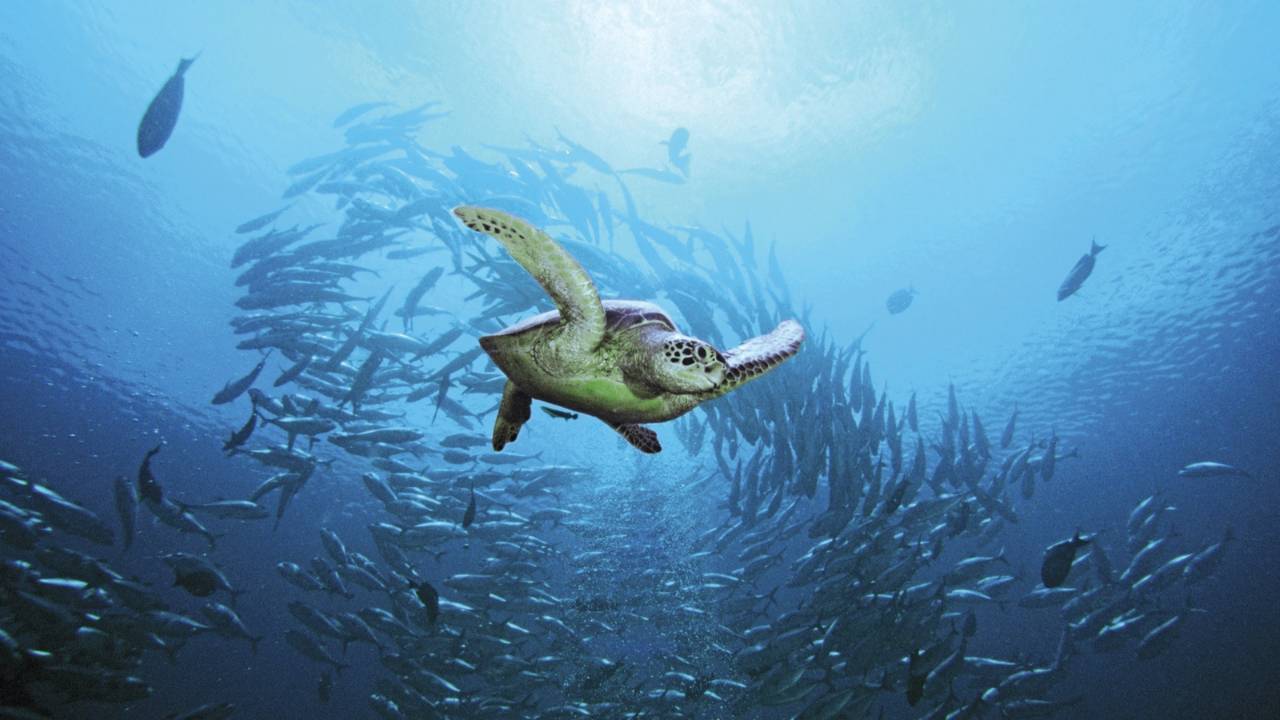 Photo credit: Marine Savers
Photo credit: Marine Savers
Conservation Programs
The Maldives offers a variety of conservation programs, which aim at protecting the country’s magnificent marine ecosystems and the creatures that live within them. The volunteer-based programs focus on a range of conservation issues such as the rescue, rehabilitation, and protection of sea animals such as sea turtles, manta rays, and sharks, as well as the preservation of coral reefs, community development, and education.
Turtle Conservation
Five of the world’s seven species of sea turtles live in the Maldives, and two of these are regularly seen, namely the critically endangered hawksbill turtle (Eretmochelys imbricata) that inhabits the coral reefs, and the endangered green turtle (Chelonia mydas), which feeds on seagrass, keeping the seabed healthy and productive. Olive ridley turtles (Lepidochelys olivacea) are sadly most often found in Maldivian waters after becoming trapped in drifting ghost fishing nets, while the two species more rarely spotted are thelLoggerhead (Caretta caretta) and the leatherback (Dermochelys coriacea).
In 1995, The Maldivian Ministry of Fisheries and Agriculture banned the catching or killing of sea turtle species, as well as the importation and sale of turtles and turtle products. Thanks to this much-needed law, today, turtle poaching is increasingly rare, however, sadly, the harvesting of turtle eggs from nesting females is still rife.
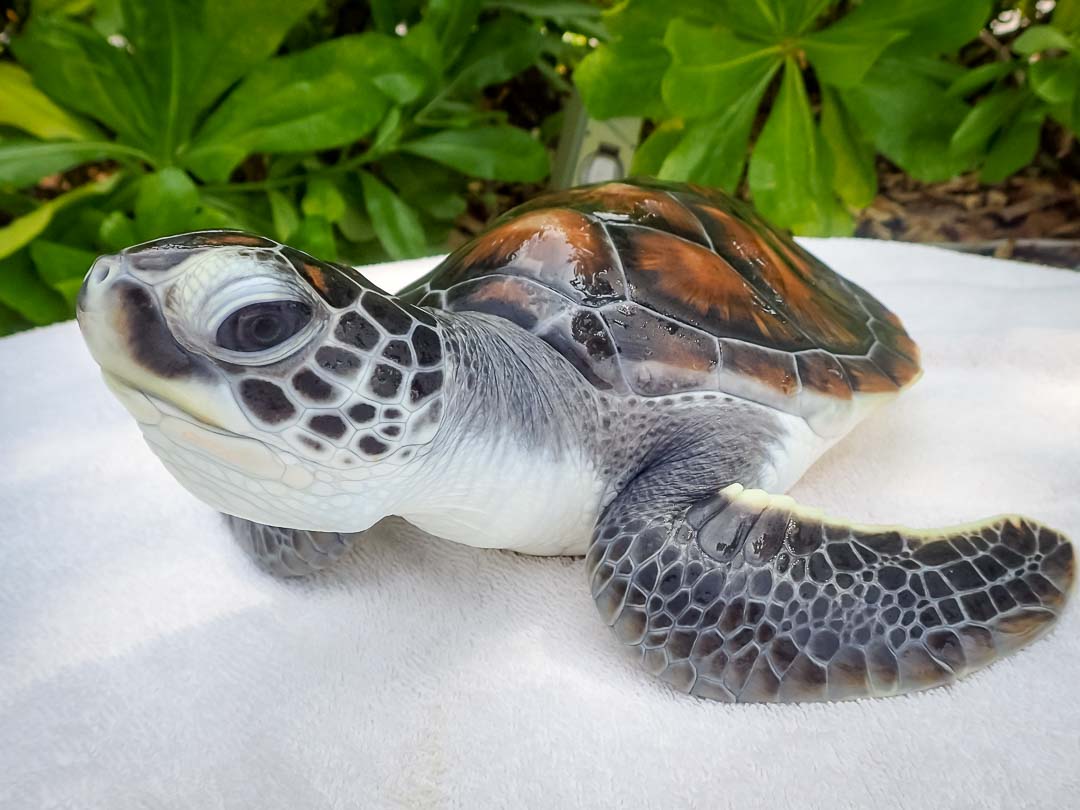 Photo credit: Marine Savers
Photo credit: Marine Savers
Following concern over dwindling sea turtle populations across the Maldives, a government-endorsed sea turtle conservation program was launched by conservation effort Marine Savers in 2011 and focuses on three critical areas of turtle conservation:
- the protection of turtle nests followed by assisted rearing;
- the rehabilitation of injured turtles;
- photo identification techniques and satellite tracking.
Based at the Marine Discovery Center (MDC) at the Four Seasons Resort Maldives at Kuda Huraa, the government-approved nest protection and rearing programs encourage the protection of turtle nests, among other conservation issues.
The Marine Discovery Center (MDC) at the Four Seasons Resort Maldives at Kuda Huraa
The Four Seasons Resort Maldives at Kuda Huraa’s Marine Discovery Centre (MDC) is an interactive research and education center that is dedicated to conserving the local and global marine ecosystem and encouraging people to take an active role in the fight to protect and save it.
Established in 2011, the center is managed by a team of marine biologists and is the headquarters of the Maldivian Sea Turtle Conservation Program that works to monitor, protect, rehabilitate and increase awareness of turtle conservation throughout the Maldives. The program also rears tiny turtle hatchlings until they are big and strong enough to defend themselves in the wild.
The Marine Discovery Center’s Maldivian Sea Turtle Conservation Program focuses on the preservation and conservation of the sea turtles and works closely with island communities across the Maldives to increase awareness of turtle conservation and protect nests from poachers.
The project rears hatchlings from protected nests for up to 15 months to give them a head start in life and improve their chance of survival in the wild. The baby turtles are kept in land-based pools for the first nine months of their lives and later relocated to larger enclosures in the lagoon where they will start to forage for themselves on seagrasses, adapting them to the wild.
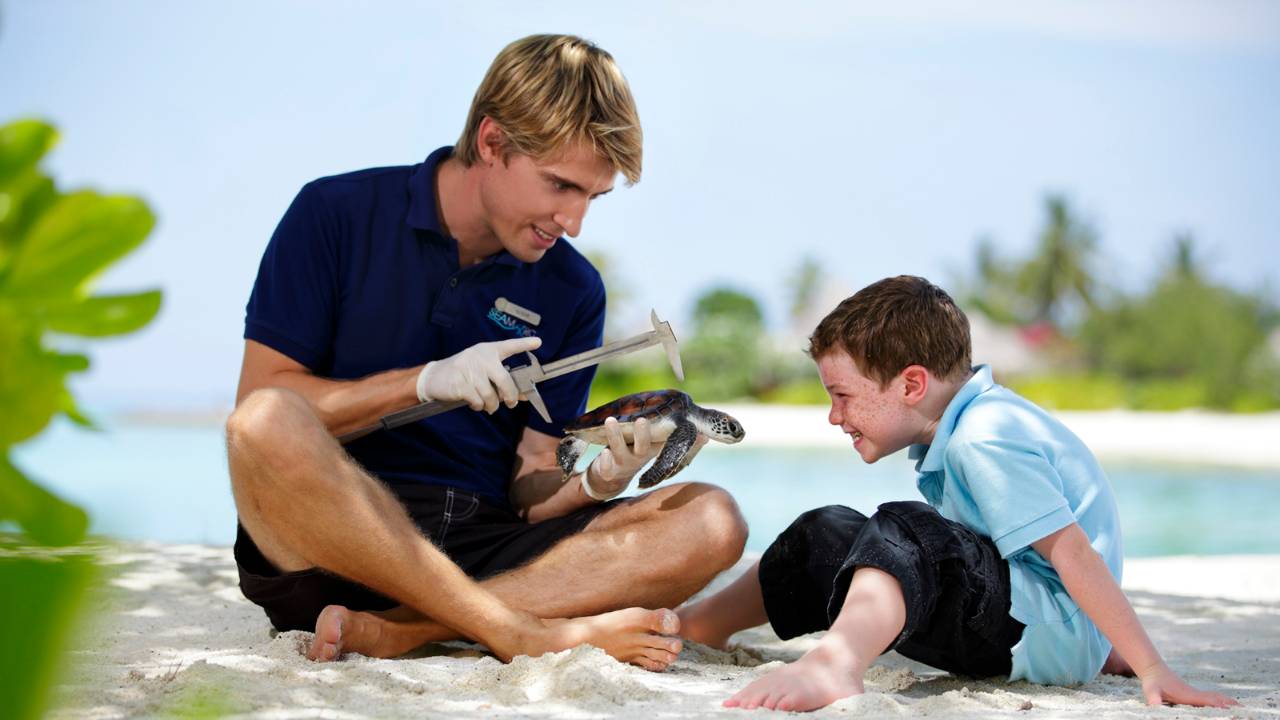 Photo credit: Four Seasons Resort Maldives at Kuda Huraa
Photo credit: Four Seasons Resort Maldives at Kuda Huraa
Sick and injured turtles are cared for, brought back to health, and rehabilitated to eventually be released back into the wild at the center’s Landaa Giraavaru Rehabilitation Centre. The majority of turtles that arrive injured or sick are Olive Ridley turtles, the smallest species of sea turtle. This little creature spends much of its time foraging in the open ocean, making it vulnerable to ingestion of marine debris, and entanglement in discarded fishing lines and ghost nets, which are thought to have drifted in on oceanic currents from India and Sri Lanka.
Other conservation programs at the Marine Discovery Center include Reefscapers, which gives guests the unique opportunity to participate in the building of the coral reefs, as well as sponsor a coral frame and watch it grow via a website.
The Shark Talk & Safari Program focuses on the protection of sharks and their environment, with a visit to the waters around the island of Bandos, which are a playground for blacktip reef sharks. The program also includes an educational briefing by a marine biologist on why sharks are one of the most valuable and vulnerable fish species in the ocean.
The Marine Discovery Center also offers a Fish Talk & Marine Life Safari program, which includes an educational briefing led by marine biologists, providing insight and understanding into the lives and habits of the turtles.
The Dolphin Talk & Dolphin Watching Cruise begins with a short briefing from the Center’s marine biologists, who provide information on this fascinating marine animal, as well as 3D movies and 2D presentations on specific areas of conservation close to the Kuda Huraa team’s heart.
“Oceans are fundamental to the health of the planet – the very lifeblood of the Earth’s ecosystem. To survive and prosper, mankind needs to have a harmonious relationship with our planet’s oceans, and it is up to us do all contribute towards the fight against plastic.”
Video credit: Mia Russell saving a turtle on a recent trip in the Maldives
Article by Mia Russell©

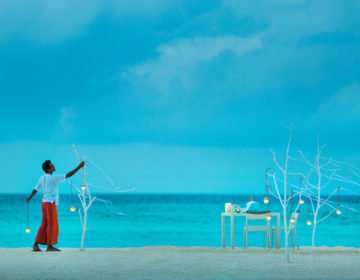
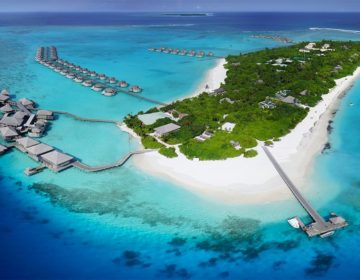
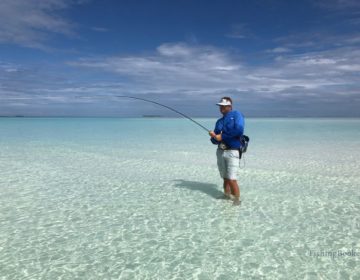
[…] are important nesting sites for the endangered green turtle (Chelonia mydas), and there are many conservation programs in place that protect these nesting sites and the tiny hatchlings that emerge from […]
[…] however, a moratorium on the capture of turtles has been in force since 1995, and there are several conservation projects and volunteer programs around the islands to protect and save […]
[…] animals have suffered severe declines at times, and the government has usually responded with an effective restriction which has prevented total extinction. Maldivian fishing regulations are enforced, unlike the […]
[…] in Hawksbills are limited, but becoming available with increasing numbers of intensively monitored, long-term projects on protected beaches. […]
[…] Reethi Rah is proud supporters of the Oliver Ridley Project, an organization that works to reduce the threat of ghost fishing nets in the Indian […]
[…] the construction of the overwater villas that damaged the corals. Most of the resort islands have a Marine Protection Charity Drive setup in the resort. I highly encourage anyone visiting the Maldives to support the Marine […]